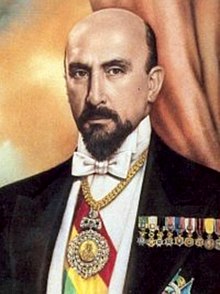Mamerto Urriolagoitia Harriague
Mamerto Urriolagoitia Harriague (born December 5, 1895 in Sucre , Bolivia , † June 4, 1974 ibid) was a Bolivian politician who was President of Bolivia between 1949 and 1951 .
Life
Mamerto Urriolagoitia Harriague, son of Mamerto Urriolagoitia and Corina Harriague, studied law at the Universidad Mayor de San Francisco Xavier in Sucre after attending school and then practiced as a lawyer . After postgraduate studies at the University of Paris , he dealt in particular with questions of international law and between 1917 and 1937 served as Consul General and Chargé d'Affaires at the Embassy in the United Kingdom and at the same time as a delegate at the London Conference in 1921 , the London Conference in 1924 and the Universal Postal Congress 1929 in London .
After his return to Bolivia, Urriolagoitia Harriague was elected a member of the Senate (Cámara de Senadores) of the plurinational legislative assembly and represented the interests of the Chuquisaca Department in this . In 1947 he was elected Vice-President and thus the representative of President Enrique Hertzog Garaizábal . After he had acted as a provisional representative since May 7, 1949, after Hertzog's resignation on October 24, 1949, he became President of Bolivia on the basis of the constitution. The most important ministers in his cabinet included Foreign Ministers Alberto Saavedra Nogales (1949 to 1950) and Pedro Zilveti Arce (1950 to 1951), Interior Minister José Saavedra Suarez and Defense Minister Hugo Ernst Rivera . On September 5, 1950, a census (Censo General de la República) was carried out, the first since 1900. It was found that the population was 3,019,031.
During his presidency he was tough and adamant about the opposition , which led to the fact that numerous politicians like the secretary of the miners union FSTMB (Federación Sindical de Trabajadores Mineros de Bolivia) , Juan Lechín Oquendo , and the chairman of the Falange Socialista Boliviana (FSB), Óscar Únzaga de la Vega , went into exile. In addition, he banned the Communist Party of Bolivia , which was founded in 1950 by dissidents of the left-wing revolutionary party PIR (Partido de Izquierda Revolucionaria) such as Mario Monje . In the economic arena, there have been freezes in wages for workers, slowdowns in factory closures and restrictions. On the other hand, in 1951 the salaries of civil servants rose by 30 percent, while miners' wages were still frozen. This led to significant social conflicts and ultimately to a general strike in the central mining area Siglo XX of the mining company Patiño Mines , which belonged to the family of Simón I. Patiño and his son Antenor Patiño . President Urriolagoitia then had some leaders of the insurgent miners arrested, who then reacted by taking hostages and ultimately killing two foreign workers. This was followed by a bloody suppression of the strike by units of the armed forces of Bolivia , which in turn led to further strikes and unrest in other parts of the country, before a state of emergency was finally declared for the whole country. The result was a civil war that the government could no longer suppress.
This situation led to the victory of the National Revolutionary Movement MNR ( Movimiento Nacionalista Revolucionario ) and its presidential candidate Víctor Paz Estenssoro in the elections on May 6, 1951, which was another massive setback for the government. Urriolagoitia did not recognize the result of the election and refused to hand over the office to Paz Estenssoro, who was still in exile at the time. Ultimately, on May 16, 1951, there was an unconstitutional takeover of power by a military junta chaired by General Hugo Ballivián Rojas , before he was finally replaced in the course of the national revolution in April 1952 by the legally elected President Paz Estenssoro. Urriolagoitia then withdrew from political life.
publication
- Bolivia (1825-1925)
Web links
- Biography in Biografías y Vidas
Individual evidence
- ↑ Presidents of Bolivia (rulers.org)
| predecessor | Office | successor |
|---|---|---|
| Enrique Hertzog Garaizábal |
President of Bolivia 1949–1951 |
Hugo Ballivián Rojas |
| personal data | |
|---|---|
| SURNAME | Urriolagoitia Harriague, Mamerto |
| BRIEF DESCRIPTION | Bolivian lawyer, diplomat and politician |
| DATE OF BIRTH | December 5, 1895 |
| PLACE OF BIRTH | Sucre |
| DATE OF DEATH | 4th June 1974 |
| Place of death | Sucre |
